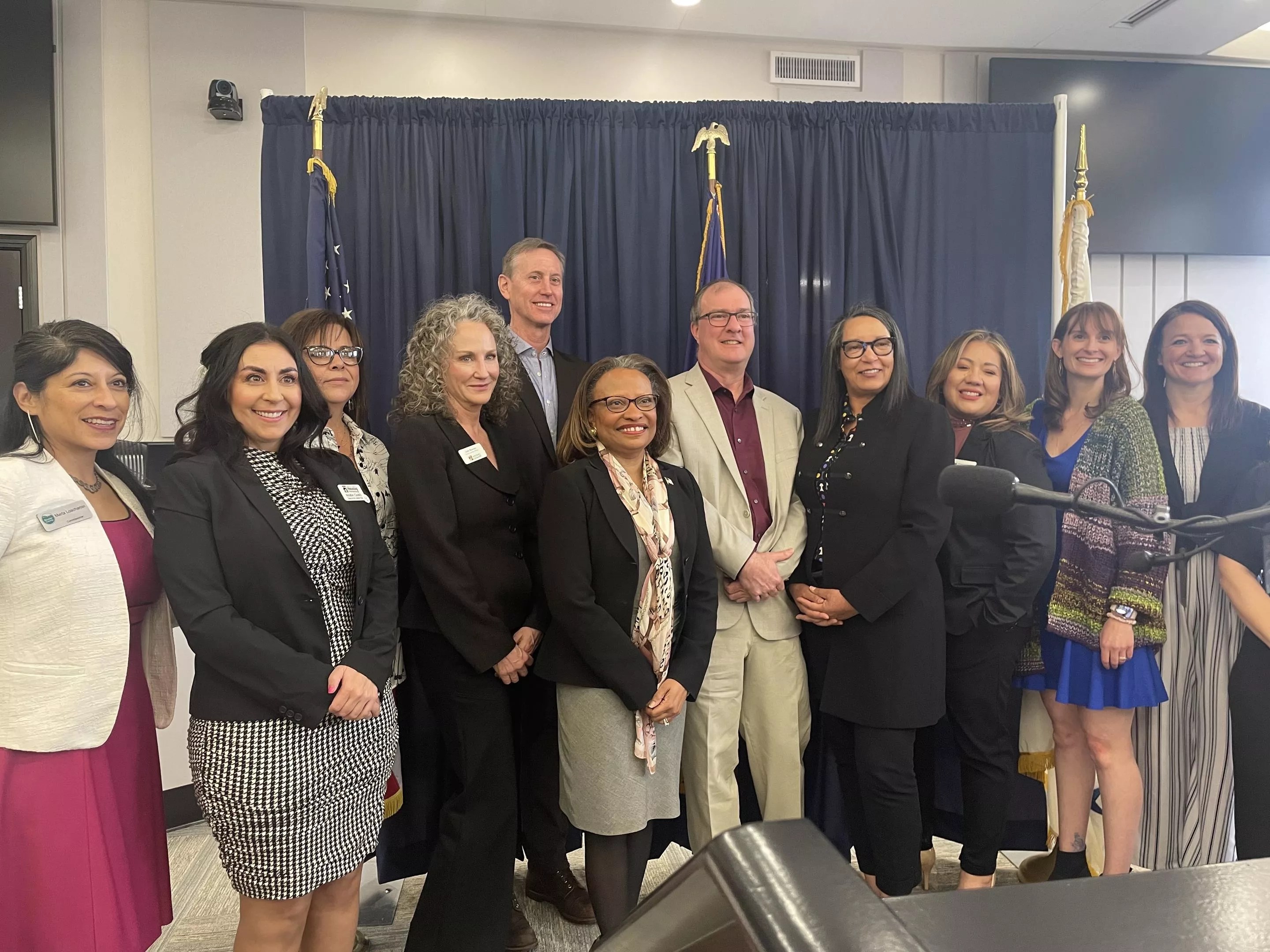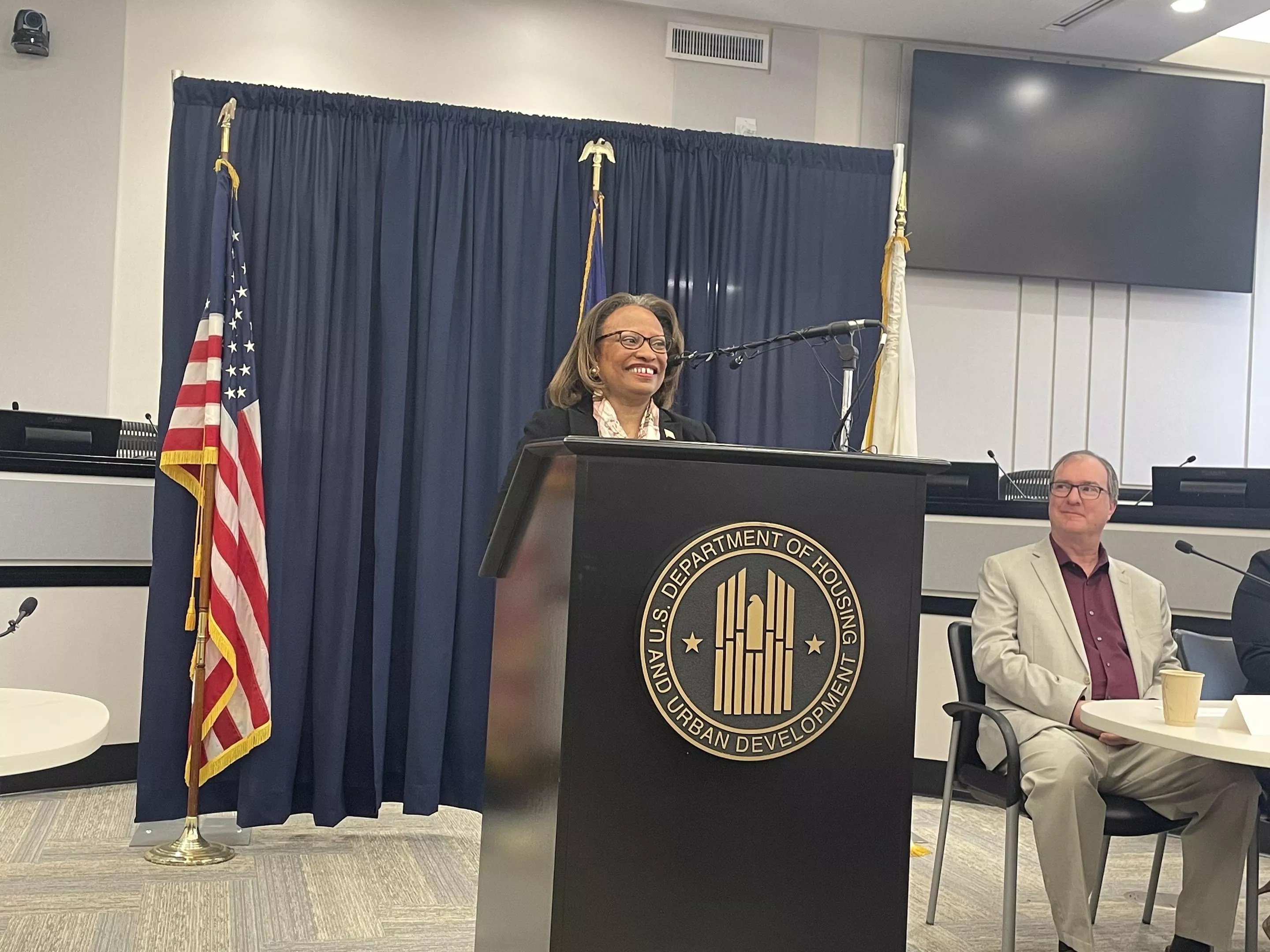
Catie Cheshire

Audio By Carbonatix
As Ronald Reagan once famously said, “The nine most terrifying words in the English language are: I’m from the government, and I’m here to help.”
The U.S. Department of Housing and Urban Development (HUD) recognized a nugget of truth in that statement with its Moving to Work (MTW) Demonstration program. The program gives local housing agencies the flexibility to use millions of federal dollars in ways they believe will best serve their communities, rather than being constrained by the usual requirements for where money must be spent.
“Housing agencies across the country have no opportunities to customize their HUD programs and funding to meet their local needs,” Acting HUD Secretary Adrianne Todman said at the Boulder County Historic Courthouse on March 29. “I know that what’s critical to folks here in Boulder County is very different than in Charlotte, North Carolina, or San Diego, California.”
Today, March 29, HUD announced the Boulder County Housing Authority is part of the latest MTW expansion and the last of an additional 100 local housing authorities Congress allowed HUD to select starting in 2021.
“Imagine that you’re a housing provider, you want to build new housing – something that I know is needed here in this region – and you have all your clients, but you just need a little bit more money to make the deal work,” Todman said. “You know you have HUD funds to do it, but you’re not allowed to. Imagine if one day HUD said to you, ‘Guess what? You now can control how you’re going to use your funds and you’re able to close that deal.'”
Solutions like Todman described are just what the MTW program allows, as participating housing authorities can mix their public housing Operating Fund, public housing Capital Fund and voucher funds.
“For example, an MTW agency could use Public Housing Capital Funds to issue additional vouchers or use voucher funds to develop more public housing to better fit the needs of its community,” the MTW website explains.
Housing authorities also get exemptions from certain public housing and voucher rules, but they are required to serve as many low-income families as they would have if the funds hadn’t been shifted around. Ultimately, the program’s goal is to promote innovative solutions specific to regions that help people get housing and stay housed, according to HUD.

Acting HUD Secretary Adrianne Todman spoke in Boulder.
Catie Cheshire
Affordability Challenges in Boulder
“Now more than ever, everyone in every corner of our nation is facing difficulty in finding housing that they can afford, and we are witnessing more people getting closer to the devastating reality of homelessness,” Dominique Jackson, HUD regional administrator for the Rocky Mountain Region, said during the announcement event.
A recent study by Smart Asset concluded an individual needs $96,500 to live comfortably in a major U.S. city while families need about $235,000 to do the same. The study didn’t examine Boulder, but found in nearby Denver the need is even higher than average, at $106,579 and $272,314.
In Boulder, a single-person household making $74,400 per year is only at 80 percent of the Area Median Income and can qualify for Housing Choice Vouchers. A family of four qualifies at 80 percent AMI with $106,240 annually.
To buy a home in Boulder County, the median purchase price is slightly lower than $1 million, according to Rocket Homes. The average rent for an apartment in Boulder is $2,405 while the overall median rent in the city stands at $1,902, data from Rent Cafe shows.
At the press conference, Boulder Mayor Aaron Brockett shared there will soon be 4,000 permanent affordable units in the Boulder, which represents a little less than 10 percent of the city’s total housing units.
Bockett said he’s excited for more people to be able to access affordable housing under the MTW program. In order to qualify, affordable housing agencies must apply and prove how effectively they can use and benefit from the flexibility. Additionally, only agencies that are already considered high performers by HUD can qualify.
How Moving to Work Can Help
In 2021 the Brighton Housing Authority became an MTW participant. Susana Lopez-Baker, who led that authority at the time, now manages the Boulder County Housing Authority.
“We’ve seen the benefits,” she, tells Westword. “In Brighton, they chose to do a lot more resident services. It was a way to generate dollars for resident services, which it is very difficult to come by any sort of seed funding for that.”
During the press conference, Lopez-Baker said Boulder County will be looking to expand its project-based rental assistance program. The county will also try to find partner organizations in Boulder to improve resident services and strengthen its family self-sufficiency program; it may use the program’s allowances to cut red tape for voucher applicants and staff, as well.
Boulder Housing Partners, the housing authority for the City of Boulder, has been part of the MTW program since 2011. Frank Alexander, deputy director of Boulder Housing Partners, says the agency has used MTW flexibility to streamline application processes.
Now, seniors on fixed incomes who qualify for Housing Choice Vouchers to have their rent reduced only have to reapply every three years. Before, they would have had to reapply annually and give Boulder Housing Partners documentation of their medical history to qualify again.
“We don’t look at any of their doctor’s appointments,” Alexander says. “We don’t look at the prescriptions they’re taking. They just get a standard deduction. That goes for anybody with an elderly or disabled member of the household. That was one of my favorites, because it saves a lot of pain and protects privacy.”
In Colorado, the City of Fort Collins Housing Authority and the Jefferson County Housing Authority were both added to the MTW in 2022. Now it’s Boulder County’s turn to operate with fewer constraints.
“I believe we will continue to pave the path of innovation that we still need during our housing crisis,” Todman said.”I look forward to seeing what the good folks in Boulder County will do. I know that you all will make us proud.”